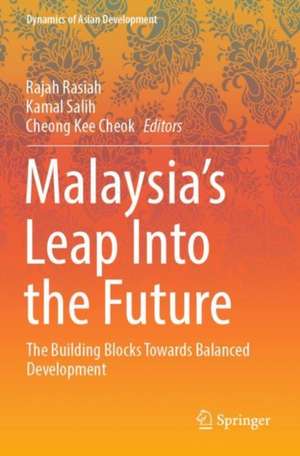Malaysia’s Leap Into the Future: The Building Blocks Towards Balanced Development: Dynamics of Asian Development
Editat de Rajah Rasiah, Kamal Salih, Cheong Kee Cheoken Limba Engleză Paperback – 23 mar 2023
| Toate formatele și edițiile | Preț | Express |
|---|---|---|
| Paperback (1) | 948.79 lei 6-8 săpt. | |
| Springer Nature Singapore – 23 mar 2023 | 948.79 lei 6-8 săpt. | |
| Hardback (1) | 954.93 lei 6-8 săpt. | |
| Springer Nature Singapore – 22 mar 2022 | 954.93 lei 6-8 săpt. |
Preț: 948.79 lei
Preț vechi: 1157.06 lei
-18% Nou
Puncte Express: 1423
Preț estimativ în valută:
181.55€ • 190.23$ • 150.08£
181.55€ • 190.23$ • 150.08£
Carte tipărită la comandă
Livrare economică 11-25 aprilie
Preluare comenzi: 021 569.72.76
Specificații
ISBN-13: 9789811670473
ISBN-10: 9811670471
Pagini: 361
Ilustrații: XXIII, 361 p. 55 illus., 14 illus. in color.
Dimensiuni: 155 x 235 mm
Greutate: 0.54 kg
Ediția:1st ed. 2022
Editura: Springer Nature Singapore
Colecția Springer
Seria Dynamics of Asian Development
Locul publicării:Singapore, Singapore
ISBN-10: 9811670471
Pagini: 361
Ilustrații: XXIII, 361 p. 55 illus., 14 illus. in color.
Dimensiuni: 155 x 235 mm
Greutate: 0.54 kg
Ediția:1st ed. 2022
Editura: Springer Nature Singapore
Colecția Springer
Seria Dynamics of Asian Development
Locul publicării:Singapore, Singapore
Cuprins
Chapter 1. Introduction.- Chapter 2. Explaining Malaysia’s Economic Growth.- Chapter 3. Population and Demography.- Chapter 4. Agriculture and Food Security.- Chapter 5. Manufacturing Transformation.- Chapter 6. Knowledge-based Services.- Chapter 7. Education.- Chapter 8. Talent and Human capital.- Chapter 9. Financing Development.- Chapter 10. Future of Labour.- Chapter 11. Poverty and Inequality.- Chapter 12. Urbanization and Infrastructure.- Chapter 13. Natural Environment.- Chapter 14. Healthcare and Well Being.
Notă biografică
Rajah Rasiah, Ph.D., is Distinguished Professor of Economics at the Asia-Europe Institute, University of Malaya. His research interests include technology and international development, foreign investment, human capital, public health, and environment. He holds external positions at UNU-MERIT, Oxford University, Cambridge University, and Universiti Tenaga Nasional. He is the 2014 recipient of the Celso Furtado Prize awarded by the World Academy of Sciences for advancing the frontiers of social science thought.
Kamal Salih, Ph.D. is an Executive Chairman of Ankar Corporation and Chairman of Malaysia Institute of Economic Research (MIER). He has served as Senior Technical Advisor to UNDP Malaysia and was Adjunct Professor of Economics and Development Studies and Senior Advisor to Asia Europe Institute in University Malaya.
Kee-Cheok Cheong is currently Senior Research Fellow, Institute of China Studies, and Senior Advisor, Asia Europe Institute, University of Malaya. As a graduate of the University of Malaya, he obtained his Ph.D. at the London School of Economics. Upon his return from studies, he joined the Faculty of Economics and Administration, University of Malaya, where he held the positions of Deputy Dean and Dean of Faculty. After a decade at UM, he spent 16 years at the World Bank in the capacity of Economist and subsequently Senior Economist. At the Bank, he was Coordinator for China and Vietnam in the Economic Development Institute, now the World Bank Institute. After returning to Malaysia in 2000, he has continued as Consultant for the Bank and UN agencies. Back with the University of Malaya since 2010, he has coauthored books, book chapters, and published numerous papers in top-tier academic journals as well as successfully supervised Ph.D. students, both international and local.
Kamal Salih, Ph.D. is an Executive Chairman of Ankar Corporation and Chairman of Malaysia Institute of Economic Research (MIER). He has served as Senior Technical Advisor to UNDP Malaysia and was Adjunct Professor of Economics and Development Studies and Senior Advisor to Asia Europe Institute in University Malaya.
Kee-Cheok Cheong is currently Senior Research Fellow, Institute of China Studies, and Senior Advisor, Asia Europe Institute, University of Malaya. As a graduate of the University of Malaya, he obtained his Ph.D. at the London School of Economics. Upon his return from studies, he joined the Faculty of Economics and Administration, University of Malaya, where he held the positions of Deputy Dean and Dean of Faculty. After a decade at UM, he spent 16 years at the World Bank in the capacity of Economist and subsequently Senior Economist. At the Bank, he was Coordinator for China and Vietnam in the Economic Development Institute, now the World Bank Institute. After returning to Malaysia in 2000, he has continued as Consultant for the Bank and UN agencies. Back with the University of Malaya since 2010, he has coauthored books, book chapters, and published numerous papers in top-tier academic journals as well as successfully supervised Ph.D. students, both international and local.
Textul de pe ultima copertă
This book presents the future development of Malaysia. It puts together building blocks to achieve a better future. These blocks are poverty and income inequality, population, demography and urbanization, growth and technological progress, education, human capital and skills, finance, labor, the environment, and health care. It examines the reasons for the decline in the agricultural sector with an emphasis on food security. It discusses Malaysia’s economic growth and structural change compared to some of the Northeast East Asian and Southeast Asian countries. It explains the projections of population and demographic change and its bearing on government policies. It evaluates the country’s education sector and discusses the strategies to improve its role in the country further. It argues for replacing ethnic-based approaches with a needs-based system for the future direction to build a plural Malaysia. This insightful book is of interest across several fields, including demography, economic development, and urbanization.
Caracteristici
Examines the political economy of Malaysia to build a better future Examines national economy using an interdisciplinary set of lenses Brings together work from international and leading researchers in academia and industry










